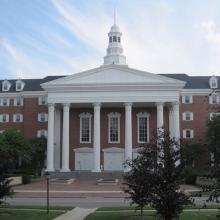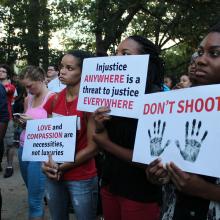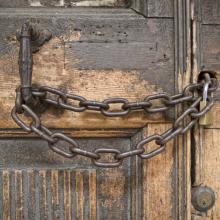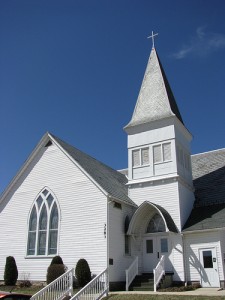White Evangelicals
In an age when both explicit and implicit biases are becoming legitimate justifications to curse the image of God, it is time for the church in the U.S. to face itself. It is time to repair the broken fabric of our nation. It is time to interrogate the stories we tell our selves about ourselves by immersing ourselves in the stories of the other.
Until the past year, I’d never seen a religious demographic — in this case, white evangelicals — so shamelessly coupled with a partisan identity. I thought Christians were citizens of heaven, whose faith transcends political divisions with the love of Jesus. Instead, it seems we have collectively placed ourselves, or been placed, on one side of a culture war in which no one seems to be winning, but all sides are becoming increasingly suspicious, cynical, and self-protective.
The centerpiece of President Trump’s religious freedom agenda, and the carrot he often dangled in front of Christian leaders as he sought their support during the campaign, was a pledge to overturn a 1954 law that says houses of worship can lose their tax-exempt status if they engage in partisan campaigning.
But a new survey of evangelical leaders — mainly pastors whose flocks were crucial to Trump’s victory in November — shows that close to 90 percent of those asked opposed the idea of clergy endorsing politicians from the pulpit.
Exit polls suggest 81 percent of white evangelicals voted for President-elect Donald Trump.
But support for Trump may have been less decisive on Christian college campuses, where most students are also white evangelicals.
A Washington Post/ABC News poll, before the election, found the views of younger adults do not align with some older ones, when it comes to their beliefs about Trump supporters.

Image via Bildagentur Zoonar GmbH/Shutterstock
My people — that is, white evangelical Protestants — aren’t good at talking about race.
This fact has been born out by years of social scientific research. A number of years ago, based on thousands of interviews with evangelicals around the country, Christian Smith and Michael Emerson posited that, "evangelicals have a theological world view that makes it difficult for them to perceive systemic injustices in society."
Unfortunately, the situation hasn’t improved much in recent years. In 2014, the Public Religion Research Institute found that two-thirds of white evangelicals agree that black and white Americans receive equal treatment under the law. More than 80 percent of black Protestants disagreed with the same statement.
Apparently, white evangelicals just don’t think race is that big of a problem. And even if we did, we don’t have the conceptual tools necessary to address the underlying, structural forces at play. It’s time for us to start listening. But how? Where do we begin?
With Ta-Nehisi Coates.
These are anxious times for white evangelicals, according to two new surveys.
At 20 percent of U.S. adults, they are statistically neck-and-neck with the “nones” — people who claim no religious brand. “Nones” now tally up to 19 percent in the 2014 American Values Survey, said Robert Jones, CEO of the Public Religion Research Institute, which released the survey Sept. 23.
Evangelicals, said Jones, are on “the losing side of the culture wars, such as gay marriage, and they see that their share (of society) is shrinking and aging, adding to their sense of being embattled.”
“They can no longer say confidently they speak for all people of faith.”
Perhaps for that reason, white evangelicals, more than any other religious group, worry that the government will interfere with their religious liberty.
The survey asked which concerned people more: The government interfering with their ability to “freely practice their religion” or “religious groups trying to pass laws that force their beliefs on others.”
The overall answer was a tie — 46 percent of Americans overall for each viewpoint. But white evangelicals were significantly more worried about government interference (66 percent) than any other group.
I’ve been calling it the Summer of Helplessness.
From the conflict in Gaza that has left more than 1,000 civilians dead, to the downing of Malaysia Airlines Flight 17 over the skies of Ukraine, to the Ebola breakout getting worse by the day, to the shooting of yet another unarmed black teenager here in the U.S., the news of late is enough to make a person feel paralyzed with helplessness and despair. My prayers these days are of the tired, desperate sort: How long, O Lord? Will you hide your face from us forever?
But when it comes to violence and oppression, we are rarely as helpless as we think, and this is especially true as the events unfolding in Ferguson force Americans to take a long, hard look at the ongoing, systemic racism that inspired so many citizens to protest in cities across the country this week.
I’ve heard from many of my white friends and readers who say they aren’t sure how to respond to the anger and grief they are watching on TV or hearing from their black friends. They want to be part of the solution but don’t know where start. They may even feel a little defensive when they hear people talking about white privilege or inaction on the part of white Christian leaders. I’m in the process of learning too, but as I’ve listened to people of color whose opinions I trust, I’ve heard them issue several calls to action we can all heed.
Yesterday was one of the craziest days in recent American political history. House Majority leader Eric Cantor fell to Tea Party economics professor David Brat in a primary upset no pundit saw coming.
While the early analysis suggested that support for immigration reform may have been what brought Cantor down, exit polling suggests his lack of attention to the concerns of his constituents and his inability to deliver on his promises were a greater factor than the immigration issue. Cantor never brought a vote on immigration to the floor and was never a strong ally on immigration.
Earlier on Tuesday, the Public Religion Research Institute (PRRI) released an immigration poll at the Brookings Institute. Nearly 80 percent of all Americans and nearly two-thirds of white evangelical Protestants remain in support of immigration reform that includes a path towards citizenship or legal status.
Over the past week, as the nation has wrestled with the implications of the “not guilty” verdict in the George Zimmerman trial, I have concluded that many in white America are desperately trying to remind African Americans that, when it comes to race in America, silence is golden. Their effort implies that any honest dialogue about race that includes the stories and experiences of African Americans disturbs the idea of the “American experience” for those of a lighter hue.
This message came through loud and clear last Friday following President Obama’s unexpected and personal reflection on the death of Trayvon Martin and the verdict on the trial of George Zimmerman.
The day after the election, Southern Baptist Seminary President Albert Mohler said, “I think this was an evangelical disaster.”
Not really. But it was a disaster for the religious right, which had again tied its faith to the partisan political agenda of the Republican Party — which did lose the election. But Nov. 6 was an even deeper disaster for the religious right’s leaders, because they will no longer be able to control or easily co-opt the meaning of the term “evangelical.”
During this election, much of the media continued to use the word as a political term — as a key constituency of the Republican conservative base. But what the media really means when they use term “evangelical” is “conservative white evangelical.” All other kinds of evangelicals are just never counted.
Just as the 2012 electoral results finally revealed the demographic transformation of America — which has been occurring for quite some time — it also dramatically demonstrated how the meaning of the word “evangelical” is being transformed.
Evangelical can no longer be accurately used to mean “white evangelical.”
When Franklin Graham expressed doubts about President Obama’s Christian faith during and interview on Morning Joe last week, it reminded me of an uncomfortable dinner I had in the late ‘90s.
I sat down for a pleasant meal in the home of two great friends — one of them a white evangelical faith leader deeply committed to social justice. Well into the evening’s conversation —when we’d dropped all our pretenses and our exchanges moved well past mealtime niceties — one friend asked me something that caught me entirely off guard.
“Do you think Martin Luther King, Jr. was a Christian?” he said.
I was dumbstruck. I had never heard anyone actually ask that question before.
“Yes,” I replied. “What would make you doubt that?”
As he explained, it became clear: My friend wasn’t sure whether Dr. King was a Christian because King’s Christianity didn’t look like my friend’s Christianity.
A new poll released this morning by Public Religion Research Institute shows the American public has clear ideas about what steps political leaders should take to reduce the federal deficit.
The poll shows that a majority of white evangelicals are opposed to cutting federal anti-poverty programs for the poor and nearly three-quarters of white evangelicals oppose cutting funding for religious organizations that help the poor.
The poll, based on a survey of 1,002 American adults performed November 10 -14, also shows a nation divided both by political affiliation and generation when it comes to attitudes towards Occupy Wall Street and the Tea Party.
The survey found that nearly 7-in-10 (68 percent) of Americans say that in order to reduce the deficit, it’s fair to ask wealthier Americans to pay a greater percentage in taxes than the middle class or those less well off.
If justice is only an implication, it can easily become optional and, especially in privileged churches, non-existent. In the New Testament, conversion happens in two movements: Repentance and following. Belief and obedience. Salvation and justice. Faith and discipleship.
Atonement-only theology and its churches are in most serious jeopardy of missing the vision of justice at the heart of the kingdom of God. The atonement-only gospel is simply too small, too narrow, too bifurcated, and ultimately too private.
In his column last week, Sojourners chief Jim Wallis talked about his frustration with the perennial misuse of the word "evangelical" by various media to describe folks and ideas that, in his view, and that of many of us who self-describe as evangelicals, don't bear any resemblance to what we understand that term to actually mean.
Below is a compilation of recent media reports where the word "evangelical" is invoked. When you read these, evangelical brothers and sisters, do you recognize yourself in how the word is used and defined? Or does it ring false to you and your understanding of what "evangelical" really and truly means?
Sign Language. Fashion Tips. Thank You. Interns. Today we say goodbye and thank you to this year's Sojourners interns. Among their other invaluable contributions to the work and mission of Sojourners, the interns wrote 72 blog posts for God's Politics! Here is a little round up of links to a few of them:
- Jesus Knows Sign Language by Taylor Johnson
- 7 Essential Tips For Fitting in With the Christian Literary Underground Scene Near You! by Betsy Shirley
- Justice For All Means Justice for Gays and Lesbians by Hannah Lythe
- Who Goes to Hell is Not the Most Important Question by Kiran Thadani
- Saleswoman + Creative Inspiration = Marketing Maven! by Alie Jones
- Deportation is Not a Family Value by Andrew Simpson












